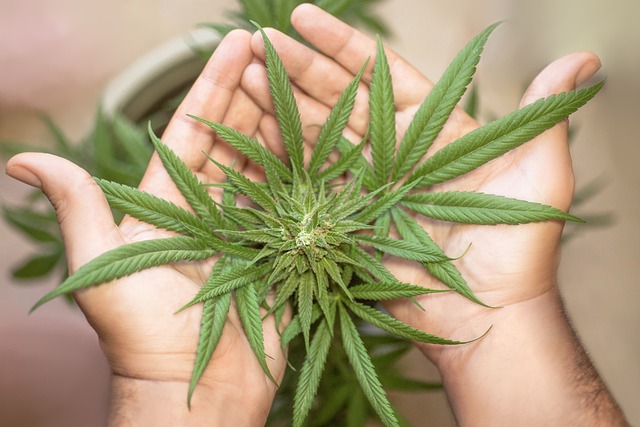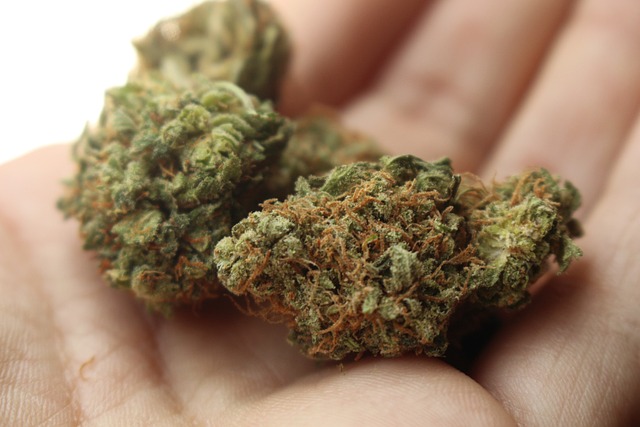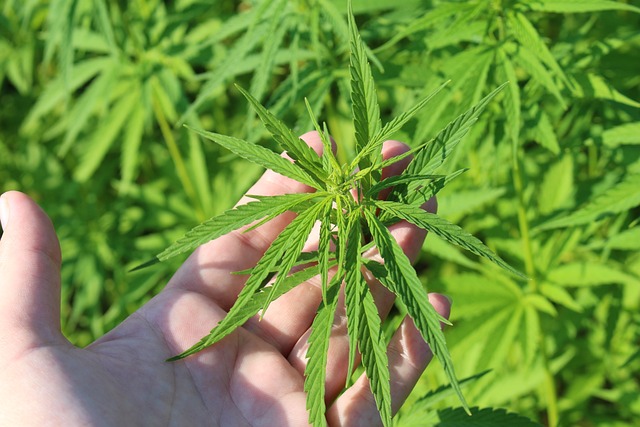In New Jersey, THCA (Tetrahydrocannabinolic Acid), a non-psychoactive compound found in raw cannabis and precursor to THC, has emerged as a subject of increasing scientific interest due to its potential health benefits, including analgesic, anti-inflammatory, and neuroprotective effects. The state's progressive legislative changes have paved the way for legal access to THCA under certain conditions, positioning New Jersey as a pioneer in exploring THCA's therapeutic properties, particularly for those seeking natural remedies for pain, inflammation, and neurodegenerative disorders without the psychoactive effects of THC. The distinction between hemp-derived and cannabis-derived THCA is critical: hemp-derived THCA is federally legal under the 2018 Farm Bill and compliant in New Jersey, provided it contains less than 0.3% Delta-9-THC, whereas cannabis-derived THCA falls under stricter state laws. Consumers are advised to be aware of the origin of THCA products and to follow state regulations, including purchasing guidelines as mandated by the New Jersey Department of Health. The legal status of THCA in New Jersey is evolving, with ongoing updates from the New Jersey Cannabis Regulatory Commission necessitating continuous vigilance for those interested in its use within the bounds of the law.
Discover the emergent wellness trends taking root in New Jersey with the rise of THCA flower, a non-psychoactive cannabinoid offering potential health benefits. As the legal landscape evolves, understanding the science and legality behind THCA becomes paramount for residents seeking natural remedies. This article delves into the therapeutic properties of THCA flower and guides New Jerseyans through the nuances of its legal status. Uncover the wellness potential of this cannabinoid and navigate its regulatory framework with clarity and confidence.
- Unlocking Wellness: Exploring THCA Flower Benefits in New Jersey's Legal Landscape
- The Science Behind THCA: Potential Health Advantages and Uses
- Navigating THCA Legality: A Comprehensive Guide for New Jersey Residents
Unlocking Wellness: Exploring THCA Flower Benefits in New Jersey's Legal Landscape

In New Jersey, the recent legislative shifts have paved the way for a new era in cannabis wellness, with THCA (Tetrahydrocannabinolic Acid) flower gaining attention for its potential therapeutic properties. As THCA is the precursor to THC (Tetrahydrocannabinol), the psychoactive compound in cannabis, it offers a unique set of benefits that are distinct from its psychoactive effects once heated. The THCA flower, legal in New Jersey under certain conditions, is celebrated for its analgesic, anti-inflammatory, and neuroprotective effects, making it a subject of interest for individuals seeking natural remedies for various ailments. Studies suggest that THCA may be beneficial in managing pain, inflammation, and even neurodegenerative disorders without the traditional ‘high’ associated with its decarboxylated form, THC.
The Garden State’s progressive stance on cannabis has allowed residents to explore the full spectrum of cannabinoids, including THCA. This non-psychoactive cannabinoid is found in raw cannabis or cannabis that has not been heated above a certain temperature. In New Jersey, where the legal landscape is evolving, the therapeutic potential of THCA flowers is being recognized for conditions ranging from chronic pain and anxiety to autoimmune diseases and more. The state’s regulatory framework ensures that consumers have access to these products in a controlled and safe environment, enabling them to harness the wellness benefits of THCA flowers while adhering to legal guidelines.
The Science Behind THCA: Potential Health Advantages and Uses

Research into the potential health advantages and uses of THCA, or tetrahydrocannabinolic acid, a non-psychoactive precursor to THC found in cannabis plants, has been a growing area of interest within the scientific community. THCA is often associated with therapeutic effects due to its interaction with the body’s endocannabinoid system. Preclinical studies suggest that THCA may possess anti-inflammatory, neuroprotective, and anti-nausea properties, which could have significant implications for various health conditions. In New Jersey, where legislation has evolved to legalize certain cannabis products containing THCA, the scientific exploration of its benefits continues to gain momentum. This legal framework allows for research and the development of THCA-based therapies that could potentially alleviate symptoms associated with pain, inflammation, multiple sclerosis, and other ailments without the psychoactive effects typically linked to THC. As such, THCA’s legal status in states like New Jersey is paving the way for a deeper understanding of its therapeutic potential and how it might be utilized in various health applications.
The interest in THCA’s medicinal properties has led to an increase in cultivation practices that preserve high levels of THCA in cannabis flowers. In New Jersey, where the regulatory environment supports such endeavors, farmers and producers are focused on optimizing conditions to maximize THCA concentration before the flower undergoes decarboxylation—a process that converts THCA into THC. This approach ensures that consumers and researchers have access to THCA-rich products for both medicinal and wellness purposes. The science behind THCA continues to evolve, with ongoing studies aiming to elucidate its mechanisms of action and the full spectrum of its potential health benefits. As this knowledge expands, so too does the interest in leveraging THCA’s unique properties within legal frameworks like those established in New Jersey.
Navigating THCA Legality: A Comprehensive Guide for New Jersey Residents

navigator_thca_new_jersey: Navigating THCA legality can be a complex task, especially for residents of New Jersey. As of recent legislative changes, Delta-9-tetrahydrocannabinol (THC) products derived from cannabis are legal for medical use, while hemp-derived THC, including THCA, is broadly legal under the 2018 Farm Bill. However, New Jersey’s specific regulations require clarity. For residents considering THCA flower benefits, it’s crucial to distinguish between hemp-derived and cannabis-derived THCA. Hemp-derived THCA products containing less than 0.3% Delta-9-THC are legal at the federal level and in New Jersey, provided they comply with state and local regulations. Conversely, cannabis-derived THCA remains subject to more restrictive state laws, even for medical patients, until New Jersey’s recreational cannabis market fully launches. To ensure compliance with both state and federal laws, residents should verify the source of the THCA product and adhere to the purchasing guidelines set forth by New Jersey’s Department of Health.
legal_landscape_thca_new_jersey: The legal landscape for THCA in New Jersey is evolving, and staying informed is key. As of the knowledge cutoff in 2023, hemp-derived THCA products are permissible under state law, with a focus on the THC concentration and the part of the plant used. Residents interested in exploring the benefits of THCA flowers must pay close attention to both the THC content and the origin of the plant material. It’s also important to note that while hemp-derived products are federally legal, state regulations can change, and local ordinances may impose additional restrictions. Therefore, New Jersey residents should consistently monitor updates from state regulatory bodies, such as the New Jersey Cannabis Regulatory Commission, to ensure they are within the bounds of the law when purchasing or using THCA products. This due diligence will help navigate the legal waters and fully enjoy the potential benefits that THCA flowers have to offer.
In recent times, the exploration of THCA flower benefits has shed light on its potential wellness properties within New Jersey’s evolving legal framework. The scientific community has delved into understanding how this cannabinoid may offer health advantages, setting a new precedent for natural remedies. For those in New Jersey seeking to harness the therapeutic potential of THCA legally, it is clear that this non-psychoactive compound holds promise. As legislative paths continue to clear for responsible use, the interest in THCA’s benefits is poised to grow, ensuring informed consumers have access to accurate and helpful guidance. The future of THCA flower within New Jersey’s health and wellness narrative is promising, offering a natural alternative with the potential to enhance overall well-being.
